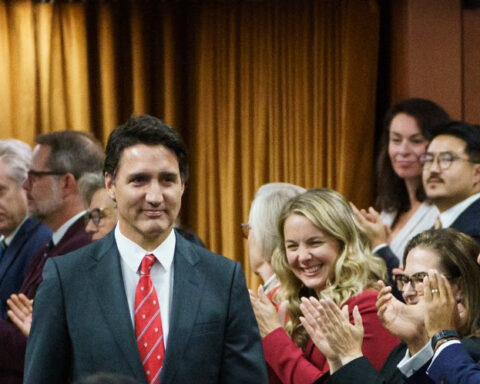Justin Trudeau has now officially been elected as Canada’s 29th Prime Minister and with him come promises of investment in infrastructure, electoral reform and changes to the lengthy family reunification process.
Some of those changes involve doubling the number of applications allowed for parents and grandparents to 10,000 each year, speeding up permanent residency applications for spouses and raising the age limit for dependants.
These changes mark a reversal to the Conservative government’s overhaul of the family reunification process in 2011.
Limitations placed by the federal government at that time on the application process meant sons and daughters living in Canada could expect to wait up to six and a half years before their parents’ applications were processed.
Changes to regulations
Allowing immigrants to sponsor their parents and grandparents is concerning to many economists and politicians because of the heavy price tag it carries.
According to Fraser Institute Senior Fellow Martin Collacott, each grandparent ultimately costs Canadian taxpayers more than $300,000 in services and welfare benefits over the course of their time in the country.
“[T]he government attempted to limit Family Class immigration after noticing that some relatives who were brought to Canada … were likely to make little economic contribution to Canada.”
In his study, titled “Canadian family class immigration: The parent and grandparent component under review,” Collacott explains that the government attempted to limit Family Class immigration after noticing that some relatives who were brought to Canada were ultimately unskilled, had limited English language skills, and were likely to make little economic contribution to Canada.
Over the last few decades, these assumptions have led to an increase in the number of economic immigrants coming to Canada from 45 per cent in 1990 to 63 per cent. To contrast, family class immigrants have dropped from 34 per cent in 1990 to 25 per cent in 2014.
The group that has most acutely felt the effects of these changes are older prospective immigrants.
In 2011, the Conservative government temporarily stopped receiving applications for sponsored parents and grandparents in order to deal with a backlog of approximately 160,000 applicants.
When the stream reopened in 2014, the government limited the total number of applicants in this category to 5,000 per year.
“At the basis of this is an assumption that only economic immigrants are important.”
Jason Kenney, who was then the Citizenship and Immigration Minister, explained these changes when they were announced, by stating: “We’re not looking for more people on welfare, we’re not looking to add people as a social burden to Canada. If their expectation is that they need the support of the state then they should stay in their country of origin, not come to Canada.”
The reforms in 2013 also increased the minimum necessary income (MNI) to sponsor parents and grandparents by 30 per cent and reduced the maximum age of dependants from 22 years old to 18.
“This is not a random phenomenon,” explains Marc Yvan Valade, a PhD candidate in policy studies at Ryerson University. “At the basis of this is an assumption that only economic immigrants are important.”
A different type of contribution
Despite these arguments, some experts argue that this focus ignores the many non-economic contributions these immigrants make.
“If it would help immigrant families to secure a stronger foothold in our society and feel even more belonging and want to contribute, well this is a gain for all of us,” says Valade. “It’s a gain not only economically in the short term, but it’s a gain in the long term as a society.”
“[Family reunification] is a gain not only economically in the short term, but it’s a gain in the long term as a society.”
A study by the Ethno-Cultural Council of Calgary found that family separation could both exacerbate the vulnerabilities of the children in these families as well as hinder meaningful integration into Canadian culture.
“Contrary to the representation of sponsored relatives as a drain on the health-care system and social services, we heard instead that sponsored parents and grandparents were playing critical roles as child care providers that allowed their children to go out and become part of the workforce in Canada,” the study explains.
The Liberals’ promise
Navdeep Bains, just-elected Liberal MP from Mississauga-Malton and a member of Trudeau’s economic advisory group, told New Canadian Media during the election campaign that the party’s policies reflect this understanding.
“Family reunification is important as it enhances the family support system,” he said. “It will have meaningful impact for new Canadians as it will enable families to earn double incomes if a couple or shift worker gets child care support from their parents. It is sound economics, as good family dynamics help people to thrive.”
In the days leading up to his party’s Oct. 19 win, long-time Liberal MP John McCallum said his party intended to “put the family reunification program back on [the] rails.”
“Super Visas are not a substitute for family reunification.”
“Let’s be clear, Super Visas are not a substitute for family reunification,” McCallum said.
Introduced by the Conservatives, the Parent and Grandparent Super Visa (Super Visa) is a temporary resident permit that allows parents and grandparents to stay for up to two years in Canada per visit, and is valid for up to 10 years.
“The family reunification program is a priority for us. It is a huge issue, that is cause for anger, frustration and tears,” added McCallum, who formerly served as the party critic on the immigration file. “We see it as part of an immigration program that will welcome new Canadians with a smile instead of a scowl.”
Valade is optimistic about these changes, but says the real test will be whether sufficient resources are made available to treat demands in a reasonable time.
“Overall, the whole Family Class program should be reviewed in a way that considers the immigrant family as an asset for Canadian society, and a contribution to immigrant integration.”
With additional reporting by Election Desk Editor Ranjit Bhaskar in the Greater Toronto Area.
This is part two of a two-part series looking at family reunification policy. Read the first installment here.
Ranjit is a Toronto-based writer with interest in Canadian civic affairs, immigration, the environment and motoring. Maytree and Al Jazzera English alumnus.






